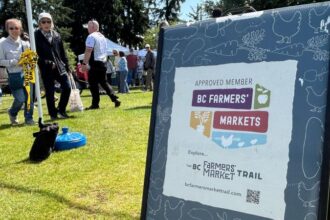In the rugged landscape of British Columbia’s interior, where mountain passes and winding roads separate small communities from urban centers, access to fresh produce has long been a challenge. Now, an innovative delivery program is breathing new life into remote community stores, transforming food security for residents who previously had limited options.
The program, launched this spring in partnership with regional farmers and transportation companies, delivers farm-fresh vegetables and fruits twice weekly to stores in communities like Hazelton, Telegraph Creek, and Fort Nelson—places where residents often faced a 3-4 hour drive to reach the nearest supermarket.
“Before this service began, our produce section was limited to whatever could survive the long shipping times,” explains Marjorie Dawson, owner of the Lakeside General Store in a community of 800 residents. “Now we’re offering everything from leafy greens to berries that arrive within 24 hours of being harvested.”
The initiative addresses a critical need in these communities, where Canada’s food security challenges have been particularly acute. A 2022 study by the University of British Columbia found that residents in remote BC communities paid up to 45% more for fresh produce than their urban counterparts, while receiving significantly lower quality items.
BC Minister of Agriculture Lana Popham visited one of the participating stores last week, noting that “this program represents exactly the kind of innovative thinking needed to strengthen rural food systems.”
The economic impact extends beyond improved nutrition. Local store owner James Whitecross reports a 30% increase in overall store traffic since joining the program. “People come for the fresh produce and end up shopping for other things too. It’s keeping more dollars in our community.”
The program hasn’t been without logistical challenges. Transportation coordinator Sarah Freeman describes the complex coordination required: “We’re working with temperature-controlled vehicles, tight delivery windows, and weather conditions that can change rapidly. Every delivery feels like a small miracle.”
Environmental considerations have been integrated from the start. The initiative prioritizes sustainable business practices by using reusable containers and minimizing packaging waste. Program administrators are also working with communities to establish greenhouse operations that could eventually supplement the deliveries with locally grown options.
For many seniors and those without reliable transportation, the program has been transformative. “I used to have to organize my whole month around one trip to a larger center for groceries,” says 78-year-old Telegraph Creek resident Eleanor Thompson. “Now I can walk to our local store and get better produce than I could before.”
As winter approaches, program organizers face their biggest test yet—maintaining reliable deliveries through BC’s notorious mountain passes during snow season. Contingency plans include potential helicopter deliveries for critical shipments during extreme weather events.
The initiative comes amid growing attention to food security issues in Canadian politics, with several provinces implementing similar programs tailored to their geography and needs.
As this program takes root in British Columbia’s remote communities, it raises an important question: could this model of connecting small-scale farmers with isolated communities create a more resilient food system across rural Canada’s diverse landscape?

























